Not every student in a course like History 117 realizes that they are entering a political battleground. Party factions and interest groups have always lobbied to influence the way the national past gets taught, but this fight has erupted again over the last year because of major changes to the Advanced Placement (AP) US History framework.
There’s a pretty good summary of the debate about the original changes in Lindsey Tepe’s article for the New America Foundation. She quotes Prof. Pinsker as claiming that the new emphasis on historical thinking skills “should be embraced by all sides,” but then provides a litany of comments from other experts who suggest he’s being painfully naive. Chester Finn, a leading conservative scholar, calls this “historical thinking” business, “the collegiate version of U.S. history—warts and all, with emphasis on the warts” and suggests that high school students at least would do better to “internalize basic chronology, fundamental events, key people, and major accomplishments.” James Grossman, executive director of the American Historical Association (AHA) says that striking the balance “is an especially difficult task.”
Grossman seems to have a good point, since things have only gotten worse since October 2014 when Tepe published her piece. This past summer, the College Board issued a revision to its previous APUSH framework, in an effort it said, to make things “clearer and more historically precise.” As you can imagine, that kind of happy talk set off alarm bells on all sides, and Rebecca Klein from The Huffington Post recently provided a lively recap about where things stand now as we head into the new academic year.
For those students who haven’t yet considered the political ramifications of a course like History 117, they should probably start doing so. They don’t need to take sides, by any means, but they should be able to explain how framing narratives, favoring certain historical figures or excluding terms (like “American exceptionalism”) can have unexpected political repercussions.

